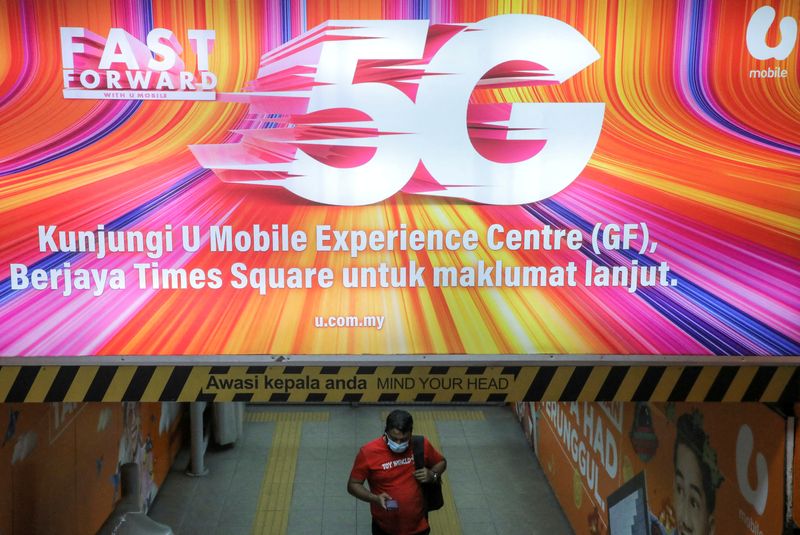
© Reuters. FILE PHOTO: An advertisement of 5G network by U Mobile carrier is displayed in Kuala Lumpur, Malaysia, September 26, 2022. REUTERS/Hasnoor Hussain
By Rozanna Latiff and Yantoultra Ngui
KUALA LUMPUR/SINGAPORE (Reuters) – Malaysia plans to introduce a second 5G network from next year, four sources told Reuters, in the latest policy shake-up aimed at dismantling monopolies and promoting competition by Prime Minister Anwar Ibrahim’s six-month-old administration.
Malaysia’s 5G roll-out by state agency Digital Nasional Berhad (DNB) has seen repeated delays since its launch in December 2021 because of industry concerns over pricing and transparency, as well as worries that a single government-run network would result in a nationalised monopoly.
Since taking office in November last year, Anwar has ordered reviews of billions of dollars in government projects as he looks to strengthen governance and minimise wasteful spending. He has also vowed to boost competition to ensure better services for the public.
Anwar’s government is now planning to introduce a second 5G network from January 2024 to challenge DNB’s lock on the market, four sources familiar with discussions told Reuters, declining to be identified due to the sensitivity of the matter.
The communications and digital ministry told Reuters no decision has yet been made on 5G.
“The matter is still under review,” Ahmad Firdaus Mohd, press secretary to the communications minister, said in a text message, without elaborating.
A recommendation by major carriers for a second 5G provider was rejected by the previous government in March last year. DNB deployed its network in late 2021 with the participation of two telecommunications firms on a trial basis.
After months of protracted talks, all but one of the country’s five mobile operators agreed in October to use DNB’s network, opening 5G services to more customers.
The roll-out came under scrutiny again, however, after Anwar took office in November and announced a review of the 5G plan, saying it had not been formulated transparently by the previous administration. DNB denied that claim.
The plan for a second network will be contingent on DNB and mobile operators ensuring that 5G network coverage reaches the government’s target of 80% of the country’s populated areas by the end of this year, the sources said.
A proposal on the plan is expected to be submitted to the cabinet on Wednesday, two of the sources said.
Four Malaysian telco firms – Maxis Bhd, U Mobile, Telekom Malaysia and YTL Communications – did not immediately respond to requests for comment.
DNB and a fifth firm, CelcomDigi, declined to comment. CelcomDigi directed further queries to the government.
Communications Minister Fahmi Fadzil said on Friday he hoped to raise 5G matters in cabinet this week, media reported. Fahmi also said last week 5G network coverage had reached 55% in populated areas.
DNB has said a single network would reduce costs, improve efficiency and accelerate the building of infrastructure.
It was not clear how the proposal for a second 5G network would affect DNB’s existing agreements with its development partner Swedish telecoms giant Ericsson (BS:), and other mobile operators.
Three carriers – CelcomDigi, Telekom and YTL – agreed last year to take up a collective 65% stake in the agency, with the government holding the remaining 35%.
Two major mobile operators – Maxis and U Mobile – declined to take up equity in DNB, Reuters reported.
U Mobile later joined other telco firms in signing up to access DNB’s 5G network. Maxis has said it will wait until the government review of DNB is completed.





